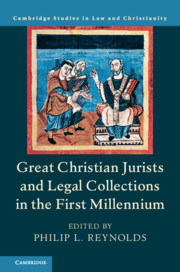Book contents
- Great Christian Jurists and Legal Collections in the First Millennium
- Law and Christianity
- Great Christian Jurists and Legal Collections in the First Millennium
- Copyright page
- Contents
- Contributors
- Preface and Acknowledgments
- Abbreviations
- Part I
- 1 Normative Texts and Practices of the First Millennium
- 2 The Many Voices of Roman Law
- 3 The Law of the Post-Roman Kingdoms
- 4 Ecclesiastical Councils
- 5 The Papacy
- 6 The Sacred Palace, Public Penance, and the Carolingian Polity1
- 7 Canonical Collections
- 8 The Practice and Literature of Penance
- 9 Monastic Rules
- Part II
- Index
- References
3 - The Law of the Post-Roman Kingdoms
from Part I
Published online by Cambridge University Press: 21 June 2019
- Great Christian Jurists and Legal Collections in the First Millennium
- Law and Christianity
- Great Christian Jurists and Legal Collections in the First Millennium
- Copyright page
- Contents
- Contributors
- Preface and Acknowledgments
- Abbreviations
- Part I
- 1 Normative Texts and Practices of the First Millennium
- 2 The Many Voices of Roman Law
- 3 The Law of the Post-Roman Kingdoms
- 4 Ecclesiastical Councils
- 5 The Papacy
- 6 The Sacred Palace, Public Penance, and the Carolingian Polity1
- 7 Canonical Collections
- 8 The Practice and Literature of Penance
- 9 Monastic Rules
- Part II
- Index
- References
Summary
As regards law and legal institutions, the period of the post-Roman successor kingdoms is understudied, misunderstood, and often maligned in histories of European law. This chapter, emphasizing the often-overlooked role of Roman law in practice and administration, begins by sketching the changing general historiographical framework that has shaped scholarly approaches to law of the period. The historiographical framework has largely been an attempt to define a Germanic order that subsumed the provincial Roman norms and structures of the former regime. The language used by modern scholars to describe the law of the period is then examined critically, especially the narrow understanding of the concept of Roman law and the expansive and uncritical application of the misleading term “Germanic.” The last part of the chapter notes the sources of law: not only the law codes of the various kingdoms but also other sources of Roman law and practice. In conclusion, the range of sources for royal legislation, administrative law, and institutional practice in the Merovingian kingdom are surveyed to illustrate their potential for fleshing out a legal profile of the period.
Keywords
- Type
- Chapter
- Information
- Publisher: Cambridge University PressPrint publication year: 2019



